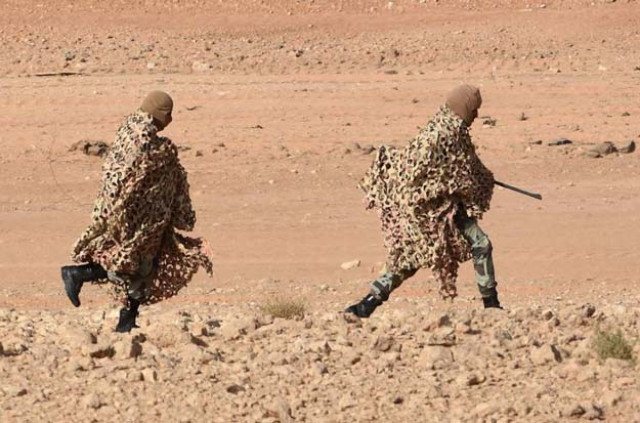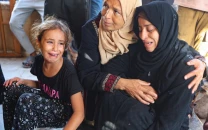Saudi special forces 'involved in Yemen ops'
Red Cross calls for 24-hour ceasefire in Yemen to deliver aid

Saudi special forces snipers run before taking a position during "anti-terrorist" exercises on March 18, 2015 PHOTO: AFP
A Saudi-led coalition began air strikes on March 26 against the Iran-backed rebels, but says it has no plans for now to deploy ground forces.
Read: Saudi Arabia launches strikes against Huthi rebels in Yemen
However, Saudi army and naval special forces have carried out specific operations, said the adviser, without revealing if they had actually set foot on the ground.
Army special forces supplied weapons and communications equipment to militia loyal to President Abedrabbo Mansour Hadi in the main southern city of Aden, the adviser told AFP.
Naval special forces provided "coordination and guidance" to enable the loyalist fighters to launch a counter-attack on the rebels.
Special forces "will continue their engagements" with the fighters loyal to Hadi, who has sought refuge in Saudi Arabia, said the adviser, who did not want to be identified.
He said army and navy special forces were also involved in operations against Huthi units that "invaded" Myun Island in the Bab al-Mandab Strait, through which much of the world's maritime trade passes.
On Friday, the coalition announced that air strikes had destroyed "military equipment and missiles" on the island, which could have posed a threat to shipping.
Read: Houthi forces in Aden pull back after air strikes
"Special forces have isolated the island as the operation continues to destroy all remnants of Huthi presence" which was supported by "foreign military" technicians, the Saudi adviser said.
Iran has dismissed as "utter lies" claims that it supplied weapons to Yemen, but a Western diplomat told AFP "there have been a lot of shipments".
Iran, which backs the Huthis, has accused Sunni-ruled Saudi Arabia of sowing instability in the region.
The kingdom's ambassador to the United States, Adel al Jubeir, had on Thursday hinted at a special forces role, saying that "we don't have troops, formal Saudi troops in Aden".
The issue of ground troops is "on the table but the decisions will be made depending on the circumstances and the need", he was quoted as saying by the Saudi-US Relations Information Service.
Red Cross calls for 24-hour ceasefire in Yemen to deliver aid
The International Committee of the Red Cross appealed on Saturday for an immediate 24-hour halt to hostilities in Yemen to deliver life-saving medical aid into the country where it said the humanitarian situation was dire.
The Saudi-led military coalition conducting air strikes in Yemen was still blocking three shipments of aid and medical staff, aid agency said earlier. Talks were being held with all parties, spokesperson Sitara Jabeen said.
"All air, land and sea routes must be opened without delay for at least 24 hours to enable help to reach people cut off after more than a week of intense air strikes and fierce ground fighting nationwide," the ICRC said in a statement.
The Saudi-led coalition, which is bombing Iran-allied Houthi fighters and army units fighting forces loyal to President Abd-Rabbu Mansour Hadi, has taken control of Yemeni air space and ports since it began its offensive ten days ago.

Armed Yemeni supporters of the separatist Southern Movement stand next to an ambulance, reportedly targeted by forces loyal to the Huthi rebels, on April 4, 2015 in the Mansura district of the the southern Yemeni port city of Aden. PHOTO: AFP
More than 48 tonnes of medicines and surgical kits – enough to treat up to 3,000 people – are ready to leave for Yemen by boat and plane, pending clearance, the statement said. An ICRC surgical team of four is on standby in Djibouti to go to Aden.
"Because there have been positive developments in our discussions, we are hopeful of getting all clearances needed by Sunday," Jabeen told Reuters.
Shortages
Hospitals and clinics are running low on medicines and equipment, according to the ICRC, which has 300 aid workers in Yemen, including foreigners. Many areas suffer fuel and water shortages, and food stocks are being depleted, it said.
"We urgently need an immediate halt to the fighting, to allow families in the worst affected areas, such as Aden, to venture out to get food and water, or to seek medical care," said Robert Mardini, head of the ICRC's operations in the Near and Middle East. "For the wounded, their chances of survival depend on action within hours, not days."
The United Nations Security Council was due to hold a meeting called by Russia to discuss a humanitarian pause in the air strikes.
UN relief coordinator Valerie Amos said on Thursday 519 people have been killed in the fighting and nearly 1,700 wounded, without specifying whether those figures included combatants.
Residents of central Aden, the southern city where Houthi fighters and their allies have been battling forces loyal to Hadi, said on Saturday some areas had been without water or electricity for two days.

Yemenis inspect the rubble of destroyed houses in the village of Bani Matar, 70 kilometers (43 miles) West of Sanaa, on April 4, 2015, a day after it was reportedly hit by an airstrike by the Saudi-led coalition against Huthi rebel positions. PHOTO: AFP
"How can we work? This is unacceptable. How long can people live without water or electricity?" said Mohammad Fara'a, a resident of Aden's central Crater district, which was briefly captured on Thursday by Houthi forces.
Another Crater resident, Hassan Abdallah, said people were resorting to a long-disused well at one of the city's mosques to get water. In the adjacent Mualla neighborhood, Abdu Hassan said his family was using up the last water in their tank.
"When that runs out, God knows what we will do," he said.



















COMMENTS
Comments are moderated and generally will be posted if they are on-topic and not abusive.
For more information, please see our Comments FAQ